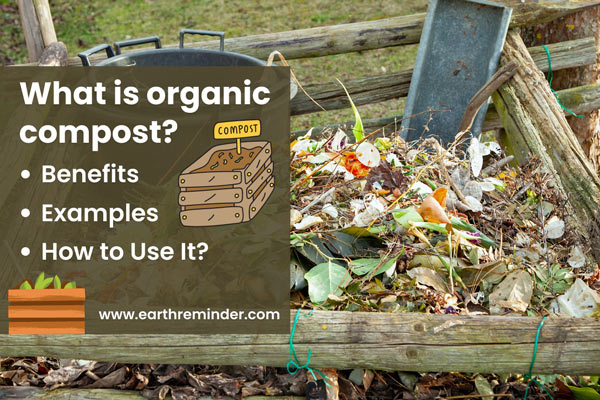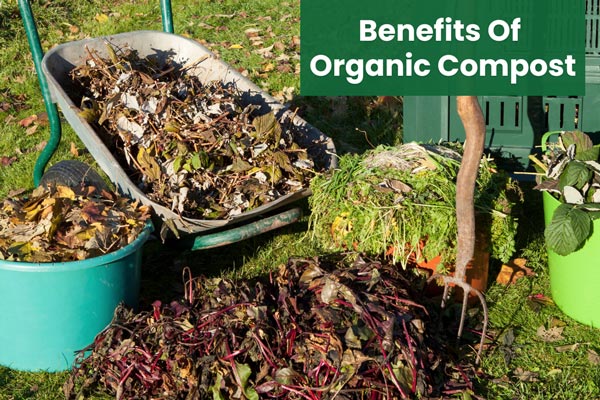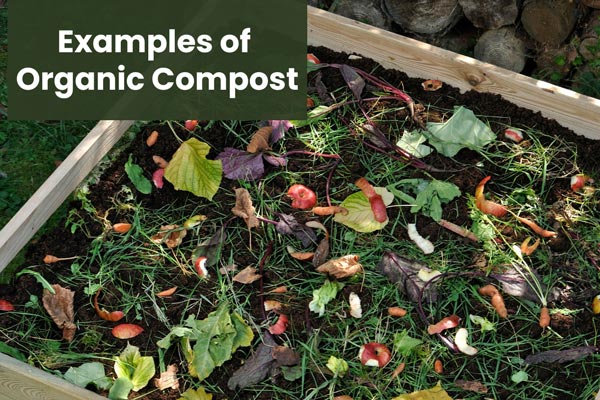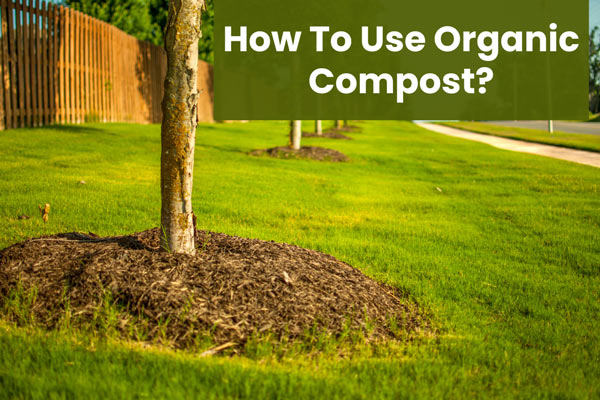What Is Organic Compost? – Benefits, Examples, and How to Use It
We’ve all heard of composting at some point in our lives, and it’s an age-old practice. You can keep your soil fertile and your plants healthy by composting organically! Here, we’ll explore the basics of organic composting, as well as the benefits, examples, and ideas for how to use it effectively in your yard or garden. Read on to learn everything you need to know about organic compost and how it can help you improve your soil and keep plants healthy.
Table of Contents
What is Organic Compost?
Organic compost is decomposed organic matter added to soil in order to improve its quality. Organic compost helps improve the texture of the soil, reduces compaction, and increases the amount of water and air that can be held by the soil.
In compost, carbon-containing materials such as fruits, woody debris, vegetables, manure, and grasses are primarily present. Compost is a mixture of decayed organic matter that is used to condition and fertilize the land.
When this raw material decomposes with the help of different fungal and microbial agents, it becomes compost after a specific time.
Also Read: How Do Organic Farming Practices Relate to Soil Health?
What is Organic Matter?
Organic matter is any living or dead thing that contains carbon-based compounds. In it, you’ll find living organisms, such as bacteria, fungi, and other microorganisms, as well as dead plant and animal matter. Approximately 2-10% of soil is organic matter, which keeps it moist, provides nutrients for plants, and nurtures beneficial microbes. When organic matter breaks down, it releases valuable plant nutrients like nitrogen, phosphorus, and potassium.
When someone uses organic compost in any agronomic and horticultural operation, it becomes a more sustainable, chemical-free, and health and environment-conscious effort.
Different microorganisms can be added externally to the pile of compost so that they can help the process of decay more efficiently.
Also Read: How Does Organic Farming Promote Sustainable Development?
Brief History of Organic Compost
The method of composting has been an ancient process of humankind. In the early 23 AD, in Rome, composting methods were practiced. They used to collect all the remaining garden materials at the end of the growing season, made a pile for decaying, and use them in the next planting season.
However, in the modern era, this composting process started around the 1920s in Europe. Then it travelled from Europe to India and then to the USA. Later, some modern composting methods were developed, which can complete the whole process in 2-3 weeks.
Also Read: Difference Between Organic Farming and Conventional Farming.
Ideal Compost Texture
- Crumbly and smooth in texture; dark and rich in colors.
- Ideally, it smells like a forest on a rainy day, but if there are any ammonia and sour smells, it will need some more time to reach maturity.
- The temperature is within 10°F of the outside temperature.
- It will become 1/3 of the original size of the pile.
Benefits Of Organic Compost
There are lots of benefits to using compost in the soil.
- It helps retain moisture in the soil for a more extended time, and more organic matter in soil helps keep the soil more aerated, which helps water and nutrients travel longer distances.
- The main 3 macro nutrients, i.e., N, P, K (Nitrogen, Phosphorus, and Potassium), and the trace elements like calcium, magnesium, iron, zinc, etc., are present in a high amount in compost.
- Organic composting is an excellent way to sequester carbon in the soil. By doing so, organic composting can help to improve soil quality and fertility, reduce greenhouse gas emissions, and provide crops with valuable organic matter.
- It helps to balance the soil pH and contains natural soil organisms like worms which helps to maintain good health in the garden.
- Using organic compost reduces soil erosion. As compost increases soil organic matter, it binds together small particles of soil, which makes it more resistant to erosion from wind and water.
- Composting organically encourages beneficial organisms such as worms and bacteria, to live in the soil. These organisms help to break down organic matter and release nutrients that plants can use and can reduce the need for pesticides and fertilizers.
Examples of Organic Compost
It is astonishing to know that the waste material we throw out can be a helpful resource for plants and the soil, and for the environment as a whole. There are tons of products out there that can eventually become compost. In general, there are four main ingredients: Air, Water, Dead plant materials, and Living Plant Materials.
The dead plant material provides the carbon, and the living plant materials provide the required nitrogen. There are many day-to-day waste materials are there which can be used as compost material. For example:
- Fruit and vegetable waste
- Adequate cooked plain rice
- Stale bread
- Crushed Eggshell
- Used tea leaves
- Coffee grounds
- Non-glossy shredded papers
- Paper towels, toilet paper, napkins.
- Chips of untreated wood
- Wooden popsicle sticks
- Toothpicks (non-plastic)
- Grass clippings
- Dried fallen leaves
- And many more
It is however necessary to take some precautions when composting organic waste because some materials can be harmful. For example:
- It is better to avoid dairy and meat use because they can attract rodents and pests and create unpleasant odors. In fact, meat can become infected with diseases such as listeria, salmonella, and E. coli.
- We should avoid diseased garden plants that have been infested with pests because they can contaminate the soil or subsequent plants.
- Avoid black walnut tree leaves and twigs because it releases harmful substances (juglone) to plants.
- Cat litter and pet waste.
- Chemical-treated yard trimmings should not be used because they can contain chemicals that may kill some beneficial organisms for composting.
Also Read: Soil Pollution: Causes, Effects, and Prevention.
How to Use Organic Compost?
There are so many different ways to use compost in your yard or garden. Here are few of them:
As Mulch
Compost can be used as mulch effortlessly and efficiently. You can spread the compost at the top of the soil as a thick layer, and this can protect the soil around the plants. The mulch retains moisture in the soil, suppresses weeds, and keeps your plants’ roots cool in summer. Here are some tips on how to use it effectively:
- Make sure you spread organic compost around the base of your plants without piling it against the stems. You should mulch generously around trees and shrubs, especially young plants.
- If it is hot outside, wet the compost before spreading it to avoid it drying out your plants.
- Over time, compost breaks down and disappears, so it must be replenished regularly.
As Compost Tea
If you want to add the nutrients of compost directly to the plant roots, you can brew Compost tea. The composition can be steeped into the Emulsion of liquids, and this process helps extract nutrients in a more concentrated form, and for plants also, it is easier to absorb. It usually takes 24 to 36 hours to prepare compost tea. Compost can help plants to grow faster. It plays the role of ’Magic Elixir,’ which contains many bacteria, protozoa, fungi, and maybe some nematodes that are much absorbable.
Spread On the Lawns
If you spread compost over the lawn, you will add valuable nutrients and organic matter that will help grow thick, healthy grass. You can use compost on lawns before planting, as well as for maintenance purposes. A 1-2 inch layer of compost can be added to the lawn before the seed is sown to enrich the soil with nutrients.
Use For Growing Fruits and Vegetables
The appropriate time to fertilize the fruit tree is early spring if the expected harvesting time is in the fall. You can use compost as mulch for your plants. Compost is nitrogen-rich and full of macro and micro-nutrient nutrients, making it ideal for fruit trees.
Melons, tomatoes, eggplants, cucumbers, and squash need plenty of nitrogen for their growth. So, adding compost to the planting holes is recommended at the time of transplanting seedlings. During the growing season, top-dress the soil several times in order to achieve the most effective results.
Use In Fall Perennials and Spring Bulbs
It is ideal to add 2-4 cups of a compost to the planting hole of perennials if you want to make them bloom longer. It will help the plant grow vigorously and healthily. Also, it benefits soil organisms, which help the ecosystem.
Furthermore, bulbs that have been recently divided should have compost added to the planting hole to help them thrive once they emerge from their winter dormancy.
Also Read: Advantages and Disadvantages of Organic Farming.
Conclusion
Organic composting improves soil quality. It will also help the soil retain moisture, helping your plants grow faster and stronger. Organic compost is an excellent addition to any garden, providing essential nutrients and enhancing natural yields. Due to its ease of use, organic compost can be incorporated into the soil immediately for immediate benefits that last forever. If you’re looking for a way to reduce your environmental footprint, or if you want to provide healthy conditions for your plants, organic compost is a suitable alternative to chemical fertilizers and treatments. Try it today and see how healthy your plants will be!



